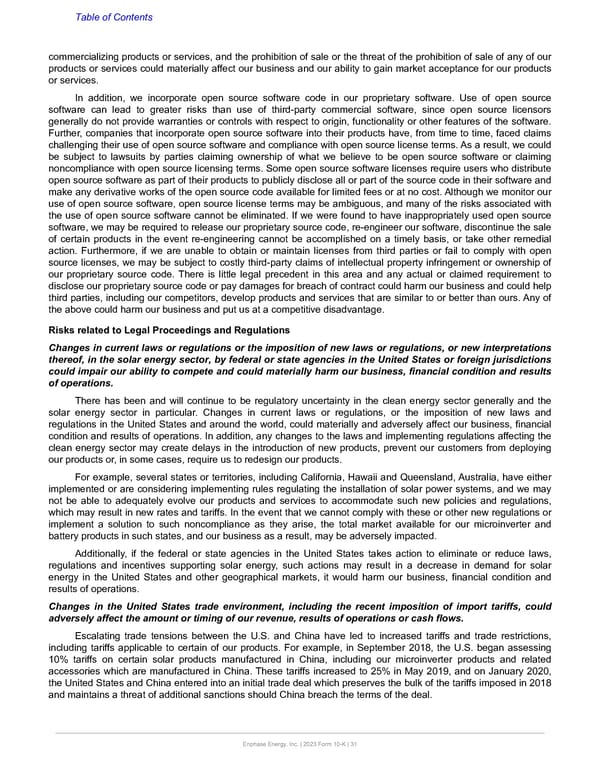Table of Contents commercializing products or services, and the prohibition of sale or the threat of the prohibition of sale of any of our products or services could materially affect our business and our ability to gain market acceptance for our products or services. In addition, we incorporate open source software code in our proprietary software. Use of open source software can lead to greater risks than use of third-party commercial software, since open source licensors generally do not provide warranties or controls with respect to origin, functionality or other features of the software. Further, companies that incorporate open source software into their products have, from time to time, faced claims challenging their use of open source software and compliance with open source license terms. As a result, we could be subject to lawsuits by parties claiming ownership of what we believe to be open source software or claiming noncompliance with open source licensing terms. Some open source software licenses require users who distribute open source software as part of their products to publicly disclose all or part of the source code in their software and make any derivative works of the open source code available for limited fees or at no cost. Although we monitor our use of open source software, open source license terms may be ambiguous, and many of the risks associated with the use of open source software cannot be eliminated. If we were found to have inappropriately used open source software, we may be required to release our proprietary source code, re-engineer our software, discontinue the sale of certain products in the event re-engineering cannot be accomplished on a timely basis, or take other remedial action. Furthermore, if we are unable to obtain or maintain licenses from third parties or fail to comply with open source licenses, we may be subject to costly third-party claims of intellectual property infringement or ownership of our proprietary source code. There is little legal precedent in this area and any actual or claimed requirement to disclose our proprietary source code or pay damages for breach of contract could harm our business and could help third parties, including our competitors, develop products and services that are similar to or better than ours. Any of the above could harm our business and put us at a competitive disadvantage. Risks related to Legal Proceedings and Regulations Changes in current laws or regulations or the imposition of new laws or regulations, or new interpretations thereof, in the solar energy sector, by federal or state agencies in the United States or foreign jurisdictions could impair our ability to compete and could materially harm our business, financial condition and results of operations. There has been and will continue to be regulatory uncertainty in the clean energy sector generally and the solar energy sector in particular. Changes in current laws or regulations, or the imposition of new laws and regulations in the United States and around the world, could materially and adversely affect our business, financial condition and results of operations. In addition, any changes to the laws and implementing regulations affecting the clean energy sector may create delays in the introduction of new products, prevent our customers from deploying our products or, in some cases, require us to redesign our products. For example, several states or territories, including California, Hawaii and Queensland, Australia, have either implemented or are considering implementing rules regulating the installation of solar power systems, and we may not be able to adequately evolve our products and services to accommodate such new policies and regulations, which may result in new rates and tariffs. In the event that we cannot comply with these or other new regulations or implement a solution to such noncompliance as they arise, the total market available for our microinverter and battery products in such states, and our business as a result, may be adversely impacted. Additionally, if the federal or state agencies in the United States takes action to eliminate or reduce laws, regulations and incentives supporting solar energy, such actions may result in a decrease in demand for solar energy in the United States and other geographical markets, it would harm our business, financial condition and results of operations. Changes in the United States trade environment, including the recent imposition of import tariffs, could adversely affect the amount or timing of our revenue, results of operations or cash flows. Escalating trade tensions between the U.S. and China have led to increased tariffs and trade restrictions, including tariffs applicable to certain of our products. For example, in September 2018, the U.S. began assessing 10% tariffs on certain solar products manufactured in China, including our microinverter products and related accessories which are manufactured in China. These tariffs increased to 25% in May 2019, and on January 2020, the United States and China entered into an initial trade deal which preserves the bulk of the tariffs imposed in 2018 and maintains a threat of additional sanctions should China breach the terms of the deal. Enphase Energy, Inc. | 2023 Form 10-K | 31
 Annual Report Page 30 Page 32
Annual Report Page 30 Page 32